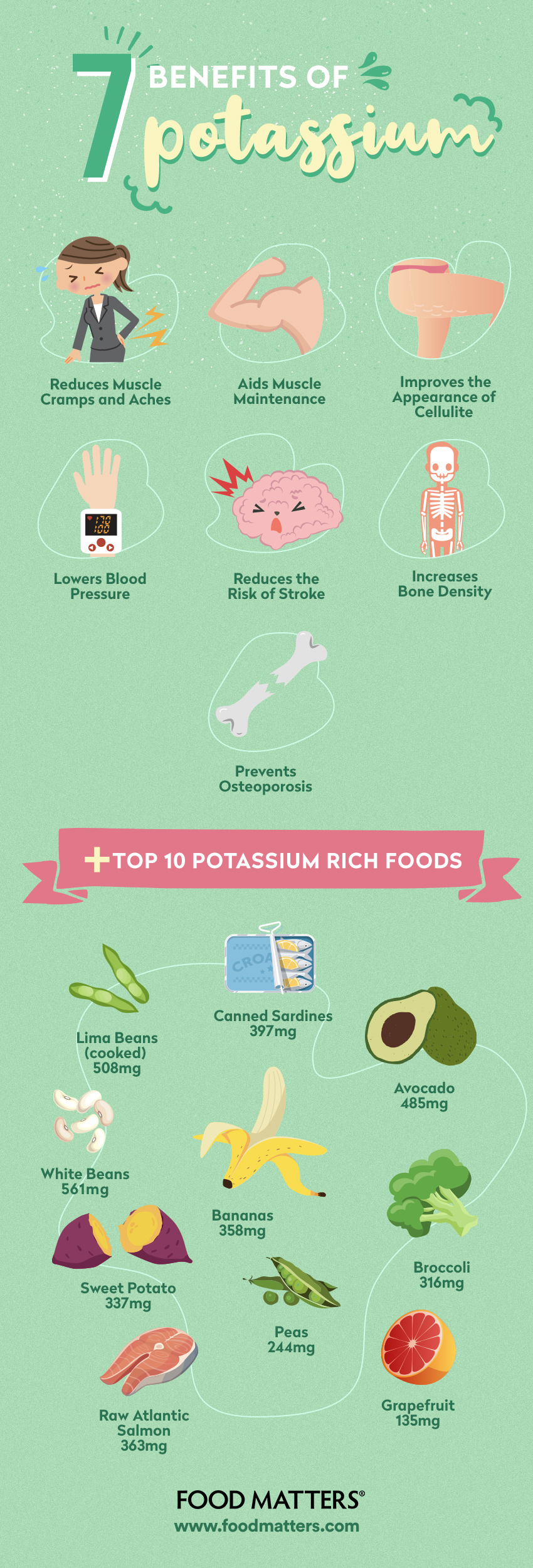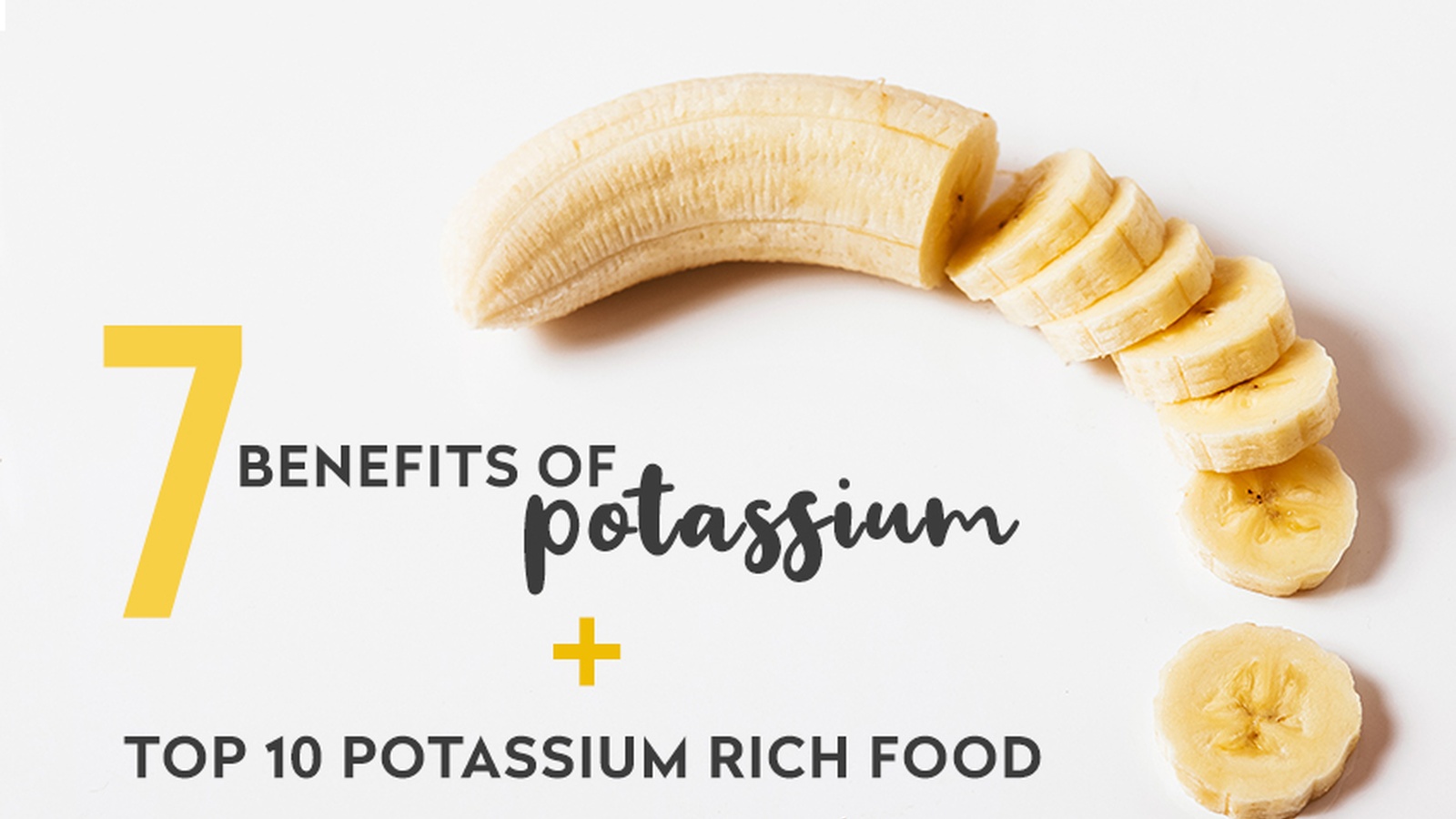7 Health Benefits of Potassium + Top 10 Potassium-Rich Foods
Potassium is an electrolyte powerhouse, it balances sodium in the body and helps maintain healthy blood pressure. It is also the third most abundant mineral in the body and is needed for your heart, kidneys, and other organs to work properly, and it keeps your bones and muscles strong. We told you it was powerful!
The current recommendations for daily potassium consumption are 2,600 milligrams for women and 3,400 milligrams for men. If you’re pregnant or breastfeeding, you need an extra 200 to 300 milligrams to help nourish your baby, and athletes who work out a lot may find they too need to up their potassium intake to avoid deficient levels.
Lucky for you, potassium can be found naturally in many foods. Fruits, vegetables, and legumes are the best sources of potassium, as are meats, poultry, fish, milk, yogurt, and nuts. Although unfortunately, not everyone is getting their potassium from these healthy foods, with many U.S. adults getting it from milk, coffee, tea, and potatoes.
To fully understand why potassium is so important, and why you need to make sure you’re reaching your daily quota, let’s look at some of its incredible health benefits.
1. Reduces Muscle Cramps and Aches
If you don’t have enough potassium in your diet, you may be prone to leg cramps and muscle aches, a great reason to boost your intake. If you take diuretic medications, have a physically demanding job, or exercise a lot and sweat excessively, you particularly need to be careful you don’t wind up with potassium deficiencies due to depleted mineral levels. Ladies, potassium can also help ease the pain of PMS cramps.
2. Aids Muscle Maintenance
A diet high in potassium can also help preserve muscle mass and improve your muscle strength. It has been found that people who consumed 5,266 milligrams of potassium per day maintained an average of 3.6 more pounds of lean tissue mass than people with an intake 50 percent lower.
3. Improves the Appearance of Cellulite
Cellulite is the bane of many women’s existence and they often turn to skin products, treatments, or surgical procedures to get rid of it. But did you know that potassium can actually help? Because fluid retention is one of the main culprits of cellulite, eating potassium-rich foods will flush this excess fluid and waste out of your cells and help improve the appearance of cellulite.
4. Lowers Blood Pressure
Because potassium reduces the effects of sodium in the body, it helps to manage high blood pressure. Potassium also helps to ease tension in your blood vessel walls, which further lowers blood pressure. As we explained earlier, potassium can be found in a range of foods, but if you’re someone who needs to lower your blood pressure, you’ll find potassium-rich fruits and vegetables are the most effective.
5. Reduces the Risk of Stroke
Potassium not only promotes heart health, it also reduces the risk of stroke. Men and women who have potassium-rich diets are less likely to have an ischemic stroke, which is the most common type of stroke. It has also been found that consuming at least 3,500 milligrams of potassium every day lowers the risk of stroke.
6. Increases Bone Density
High potassium intake can help increase your bone density and improve your bone health.
7. Prevents Osteoporosis
Potassium citrate and bicarbonate, two potassium salts that are found in foods high in potassium, have also been known to help ward off osteoporosis.
Top 10 Potassium-Rich Foods
Want to know how many milligrams of potassium are in 100g of these potassium-rich foods? We’ve done the calculations for you.
- White Beans 561mg
- Lima Beans (cooked) 508mg
- Avocado 485mg
- Canned Sardines 397mg
- Raw Atlantic Salmon 363mg
- Bananas 358mg
- Sweet Potato 337mg
- Broccoli 316mg
- Peas 244mg
- Grapefruit 135mg
Now that you know why potassium is so vital for your health, and which foods are the highest in potassium, make sure you’re incorporating them into your daily diet.

If you haven’t already, join our free global challenge at www.GetOffTheGluten.com to receive daily recipes & health tips, access to our private group for support and inspiration, plus before and after testing to track your progress in key areas of your life such as weight, sleep, bloating, skin-conditions, mental health and more!









